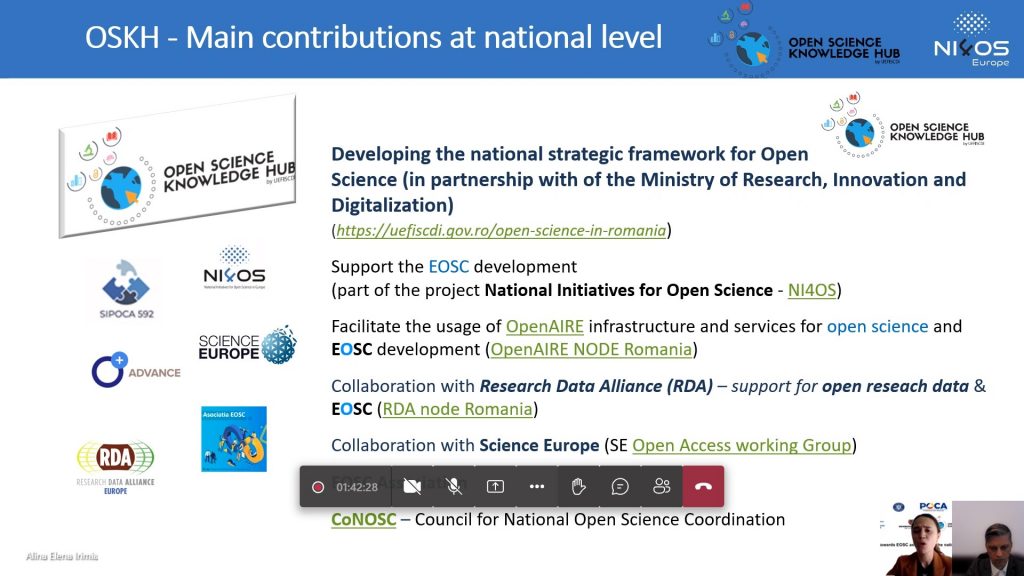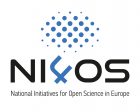
The Open Science Knowledge Hub – UEFISCDI (OSKH) (NI4OS Partner, OpenAIRE NOAD and Romanian RDA Node) in collaboration with the coordinators of the Romanian National Initiative regarding the Open Science Cloud (RO-NOSCI) joined hands with the Authority for Digitalization of Romania (ADR) and the Technical University of Cluj-Napoca (UTCN) to organize the online event entitled “The Road towards EOSC as seen from the national level”, on October 20th.
The action was part of the “Strategic framework for the adoption and use of innovative technologies in the public administration 2021 – 2027 – solutions for improving the activity” project, dedicated to drafting national strategic recommendations that will support Romania’s efforts of integrating into the European initiatives in the field of Open Science and High Performance Computing – HPC.
In this context, the organisers have launched a call for discussions and Romanian and foreign key experts presented, to a broad range of stakeholders, the importance of developing the European Open Science Cloud – EOSC, the challenges towards it and the current initiatives of support in Romania that can assist integration into EU strategy towards scientific and technological development (NI4OS-Europe Project as an incubator of the RO-NOSCI and the Romanian Initiative for Open Science Cloud, RO-NOSCI).
The discussions have been organized in the form of a 3-hour online webinar and focused on topics such as:
- The European e-infrastructures: role of OpenAIRE in EOSC
- EOSC Association recent developments & future plans
- EOSC development and support from the regional and national level: NI4OS-Europe project and the Romanian Initiative for Open Science Cloud (RO-NOSCI)
- FAIRsFAIR
- FAIR Data policies – how to support FAIR and Open Research Data at the national level
The audience has been formed of around 72 people representing members of the national research and innovation community, as well as other actors interested in the subject of Open Science and High Performance Computing – HPC.
Romanian experts (Alina Irimia – OSKH, Dragos Barbu – ICI and Gabriel Neagu – ICI) addressed topics such as recent updates from the EOSC Association, the european context of EOSC development and support from the regional and national level (NI4OS-Europe project and the Romanian Initiative for Open Science Cloud (RO-NOSCI).
One of the main ideas addresed during the event was related with OpenAIREs’ catalog of services that can be accessed via EOSC or can be accessed individually on the OpenAIRE platform. Giulia Malaguarnera – OpenAIRE representative, pointed out the importance of reviewing research evaluation and rewarding researchers for promoting open science in order to make the transition from competition to collaboration.
Other central topics addressed during the webinar session by the international experts (Ingrid Dillo – DANS and FAIRsFAIR Coordinator and Kevin Ashley – DCC and FAIRsFAIR project) were linked to what can be done before actually drafting policies so that they really make a difference and what are the 3 priorities in building the FAIR culture at national level. Shared responsibility between universities, research organizations and public bodies and also taking into account the cultural elements might prepare a favorable framework for policy implementation. Even if the policy is very good, it is important to be able to get researchers to comply with FAIR data and principles and to have a virtual research environment to work with data (to store it securely). On top of all these aspects is the cultural side – awareness and training that are needed to be able to promote the importance of FAIR data to society. This approach has a higher chance of success if it happens in an environment close to the researcher – university/research infrastructure, and also if there are incentives for researchers who adopt the principles of open science.
Among the questions raised by the participants, it worth mentioning the community’s interest in:
- Which is the current main barrier in open science?
- If a deposit is not CoreTrustSeal – CTS certified (certification involves costs to meet the requirements), how can a trusted repository could be found?
- How are CTS requirements related to FAIR principle?
Further, the Open Science Knowledge Hub – UEFISCDI (OSKH) (NI4OS Partner, OpenAIRE NOAD and Romanian RDA Node) will continue offering support through national actions for the OS strategic framework development and capacity building, connecting the national initiatives and community to the European and the international communities involved in open science.
Presentations of the webinar can be found on the UEFISCDI – Open Science Knowledge Hub Romania website here.
